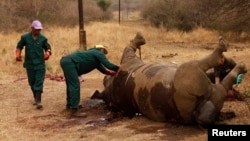South Africa’s rhino population is facing a veritable massacre from poachers, who sell the prized rhino horn to the Asian market for staggering prices. About 980 rhinos are already dead this year, and the nation is trying to determine what it can do to keep these animals safe.
Those on the front lines of South Africa’s fight to keep its fragile rhino population alive agree that saving these rare animals is a complex problem without a single clear solution.
With 1,004 rhinos killed in 2013, however, and this year’s death toll already fast approaching the 1,000 mark, are conservationists winning the war?
The answer depends on who you ask.
Rose Masela is the head of the National Wildlife Information Unit at South Africa’s Department of Environmental Affairs, and said the government is “thinking outside the box” -- by bringing in law enforcement and reaching out to communities for support -- to fight poachers.
“I don’t think if we were losing the war, we’d be standing with the number of rhinos that we are sitting with at the moment. I think we projected in 2010 that we’ll sit with just under about 7,000 rhinos -- projections -- by the end of 2013," said Masela. "And the outcome of the census of 2013 have showed that we have emerged above that number. So in terms of preserving the rhino, conserving the rhino, from that point of view, I do not think we are left wanting in terms of maintaining our rhino conservation success.”
Sting operations
Government officials point to an increasing number of stings and arrests -- like the arrest of six suspected poachers this past weekend.
Also, Masela said, in a clever but confusing bit of calculus, that the annual rate of increase in rhino deaths is decreasing.
That math is of little consolation to conservation activists like Dex Kotze, though, who say the sheer numbers are unacceptable and the government needs to do more.
“With 1,004 last year, we’re probably going to end on 1,150 dead rhinos this year, if you take the roughly every seven hours it is at the moment. You know, it’s a battle that can be won, but we need more political will. The lack of political will is where there is a huge problem,” said Kotze.
Kotze said the government’s tendency to publicize every rhino-related arrest obscures bigger problems. Poachers frequently are released on small bonds and then abscond. Trials drag on for too long and often end in sentences that are too short. And South African authorities don’t push for meaningful agreements with neighboring nations like Mozambique, where many rhino poachers are thought to live.
Legal trade proposal
Also, some conservationists propose that private rhino owners be allowed to legally trade in rhino horns, which can be harvested from a living animal at a rate of about one kilogram per year.
Demand is booming in Asia, where the horn is reputed to have medical benefits. Those alleged medical benefits have been largely dispelled by scientific research.
Pelham Jones is the chairman of Private Rhino Owners Association.
“Whilst the demand is there, we need to look to ways and means of satisfying the demand. But having said that, I must immediately couch it on the basis of saying that we do not believe trade is the silver bullet," said Jones. "It is not the single solution. It has to form part of a matrix of solutions which include demand reduction. It has to include awareness. And so it carries on."
Jones said this proposal often is criticized by those who say rhino owners are cruel and insensitive. He said his organization only arrived at this conclusion after extensive research and consideration.
“We are not being irresponsible. We are not gambling with the life of a specie here. We are trying to save a specie. We have the scars to show it. I don’t know how many of you, Dex included, have stood next behind, or next to a carcass -- a pregnant female cow, as well as a young heifer, 50 meters away. I’ll tell you, you will weep. Because your weeping will be that of the loss of a family member.”
Whatever the solution, it’s clear that the stakes -- and the emotions -- are high for all involved in the fight to save these rare and ancient animals.




